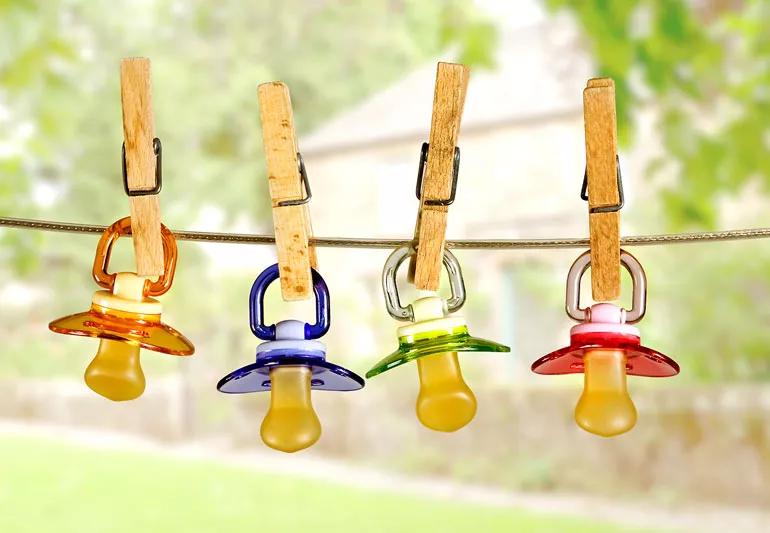What to know about keeping your baby's pacifier germ-free

Image content: This image is available to view online.
View image online (https://assets.clevelandclinic.org/transform/97f3f89b-1148-4ac7-98d9-a13458869593/washPacifiers-147242213-770x553-1_jpg)
cleaning pacifiers
Pacifiers can be a blessing (something to soothe your wailing baby) and a curse (cue that middle-of-the-night search). And then there’s the question of how to clean the thing, considering your baby spends as much time chucking it as sucking it.
Advertisement
Cleveland Clinic is a non-profit academic medical center. Advertising on our site helps support our mission. We do not endorse non-Cleveland Clinic products or services. Policy
Should you sterilize it every time it leaves baby’s mouth? Live by the 5-second rule and pretend it never hit the ground? Something in between? Pediatrician Jason Sherman, DO, shares his tips for keeping pacifiers clean — and babies healthy.
It’s unlikely your baby will get seriously ill from a dirty pacifier, Dr. Sherman says. But you should still make an effort to keep it clean.
A pacifier that hits the floor — or a tabletop, car seat or any other less-than-pristine surface — can pick up germs. Those germs might be viruses or bacteria that can cause illness. Dirty pacifiers can also spread thrush, a common fungal infection that causes white patches and uncomfortable sores in the baby’s mouth.
“Whenever a pacifier lands on the ground or another surface, clean it before putting it back in the baby’s mouth,” Dr. Sherman recommends. “You don’t want to risk the baby getting sick.”
Cleaning a pacifier doesn’t have to be complicated, though. You don’t have to go to the trouble of boiling them or using special sanitizers. A simple suds-up with hot water and dish soap will do the trick, Dr. Sherman says.
Wondering about pre-packaged pacifier wipes? They may be helpful in a pinch if you’re far from a sink. But they probably don’t work any better than plain old soap and water, Dr. Sherman notes. “They aren’t necessary if you have the use a sink or soap and water readily available.”
Advertisement
What about the age-old technique of popping your baby’s pacifier into your mouth to clean it? The spit-clean method may be common, but it isn’t one Dr. Sherman recommends.
“You might feel healthy, but you never know if you’re carrying germs,” he says. “Sucking on your baby’s pacifier could spread microorganisms that put the baby at risk.”
Some studies have suggested that, as long as the pacifier isn’t identifiably dirty, a parent sucking on a pacifier could lead to a reduced risk of allergy development for the child.
And some past research suggested that exposing babies to germs via your saliva might strengthen their immune systems. But the evidence is far from solid, Dr. Sherman says. And kids hardly need help getting dirty. “Trust me, kids will get plenty of exposure to microorganisms that will help build up their immune systems all on their own,” he says.
For infants, though, your goal should be to help them avoid germs as long as possible. “You don’t have to keep them in a bubble,” Dr. Sherman says. “But you should do your best to prevent them from getting sick — especially babies under 2 months old who don’t yet have much of an immune system and haven’t had their two-month-old vaccines.”
There’s no need to panic if your baby grabs her pacifier and pops it back into her mouth before you can clean it. Just praise her new reaching-and-grasping skills and move on.
“Odds are, it won’t be a problem for most healthy babies,” Dr. Sherman says. “But whenever you can, give pacifiers a quick rinse with soap and water just to be safe.”
Advertisement

Delivered every Tuesday!
Sign up for our Health Essentials emails for expert guidance on nutrition, fitness, sleep, skin care and more
It's a letter about the news!
Learn more about our editorial process.
Advertisement
Do babies need pacifiers?
Pacifiers have drawbacks as babies grow older
Most parents report an improvement in breastfeeding, but there’s a chance the procedure won’t solve the issue
All babies go through a perfectly normal peeling phase in the first couple weeks
Tiny kidneys and tiny tummies don’t mix well with water
You can plan for almost anything, but be flexible about the outcome
From learning to change diapers to considering your parenting style, our advice for new dads
Be assured that the getting-up-at-night phase will pass
Type 2 diabetes isn’t inevitable with these dietary changes
Applying a hot or cold compress can help with pain
Pump up your iron intake with foods like tuna, tofu and turkey